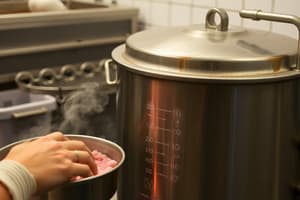Podcast
Questions and Answers
What is the purpose of gamma radiation sterilization?
What is the purpose of gamma radiation sterilization?
- To activate microorganisms
- To create microorganisms
- To inactivate microorganisms (correct)
- To observe microorganisms
What types of microorganisms are pulsed light sterilization effective against?
What types of microorganisms are pulsed light sterilization effective against?
- Bacteria and viruses (correct)
- All types of microorganisms
- Viruses and fungi
- Bacteria and fungi
What is a major advantage of gamma radiation sterilization?
What is a major advantage of gamma radiation sterilization?
- It is only effective against bacteria
- It is a low-cost method
- It is gentle on materials (correct)
- It is a traditional method
What is a limitation of gamma radiation sterilization?
What is a limitation of gamma radiation sterilization?
What is a common application of gamma radiation sterilization?
What is a common application of gamma radiation sterilization?
What is the primary advantage of low temperature sterilization methods?
What is the primary advantage of low temperature sterilization methods?
Which of the following methods uses a gas plasma to generate reactive oxygen species?
Which of the following methods uses a gas plasma to generate reactive oxygen species?
What is the primary application of Ozone Gas Sterilization?
What is the primary application of Ozone Gas Sterilization?
Which of the following methods is effective for sterilizing pharmaceuticals?
Which of the following methods is effective for sterilizing pharmaceuticals?
Which of the following methods uses nitrogen dioxide gas to inactivate microorganisms?
Which of the following methods uses nitrogen dioxide gas to inactivate microorganisms?
Which of the following methods is not effective against fungi?
Which of the following methods is not effective against fungi?
Flashcards are hidden until you start studying
Study Notes
Introduction
Low temperature sterilization refers to methods of sterilization that use lower temperatures, typically below 100°C, to inactivate microorganisms. These methods are used to sterilize heat-sensitive materials that cannot withstand high temperatures.
Methods
- Ethylene Oxide (ETO) Sterilization
- Uses ethylene oxide gas to sterilize materials
- Effective against bacteria, viruses, and fungi
- Commonly used for sterilizing medical instruments, implants, and heat-sensitive materials
- Hydrogen Peroxide Gas Plasma Sterilization
- Uses a gas plasma to generate reactive oxygen species that inactivate microorganisms
- Effective against bacteria, viruses, and fungi
- Used for sterilizing medical instruments, implants, and surface cleaning
- Nitrogen Dioxide Gas Sterilization
- Uses nitrogen dioxide gas to inactivate microorganisms
- Effective against bacteria, viruses, and fungi
- Used for sterilizing medical instruments, implants, and surface cleaning
- Ozone Gas Sterilization
- Uses ozone gas to inactivate microorganisms
- Effective against bacteria, viruses, and fungi
- Used for water treatment and surface cleaning
- Filtration Sterilization
- Uses membrane filters to remove microorganisms from liquids
- Effective for sterilizing pharmaceuticals, biologics, and other liquids
- Gamma Radiation Sterilization
- Uses gamma radiation to inactivate microorganisms
- Effective against bacteria, viruses, and fungi
- Used for sterilizing medical instruments, implants, and pharmaceuticals
- Pulsed Light Sterilization
- Uses high-intensity pulsed light to inactivate microorganisms
- Effective against bacteria and viruses
- Used for surface cleaning and packaging sterilization
Advantages
- Effective against a wide range of microorganisms
- Gentle on materials, reducing damage and degradation
- Can be used for sterilizing heat-sensitive materials
- Some methods can be used for surface cleaning and decontamination
Limitations
- May require specialized equipment and facilities
- Can be more expensive than traditional sterilization methods
- Some methods may have limited penetrability, making it difficult to sterilize complex or irregularly shaped items
Studying That Suits You
Use AI to generate personalized quizzes and flashcards to suit your learning preferences.




